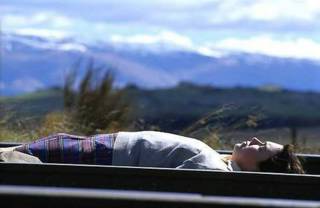In My Father's Den
Sunday, October 24, 2004
Earlier this year I was sure that Cate Shortland's Somersault had to be the directorial debut of the year, but now that I've seen the absolutely stunning In My Father's Den from first-time writer/director Brad McGann, I suspect Somersault is relegated to a close second. In My Father's Den is undoubtably the best New Zealand made film I've seen in the last decade (I don't count Lord of the Rings as an exclusively New Zealand production, but even if I did, I'd have to think hard about whether Jackson or McGann did a better job!).
In My Father's Den is shot in Central Otaga and shot well by cinematographer Stuart Dryburgh (who also framed The Piano); every visual captures the beauty of unspoiled land, every frame is pristine, every clould a water painting in motion. The human story, though, is radically juxtaposed with the landscape; it's a dark tale of complicated pasts, terrible family secrets, and a series of revelations that will leave you stunned. The film opens with Paul Prior's (Matthew MacDadyen) return to his home town, a tiny village in New Zealand's south island, from which he's been absent since leaving abruptly at the age of seventeen. There, he is awkwardly and briefly reunited with his estranged brother, Andrew (Colin Moy) after their father's funeral for which Paul has returned. Andrew has married the gaunt and haunted Penny, who is brilliantly and yet subtly played by Mirando Otto. However, the truly stellar performance comes from teenager Emily Barclay who plays Celia; she strikes up a friendship with Paul, and without giving it all away, Paul and Celia share a bond which is both unexpected and amazingly well developed. The film, although shot primarily through Paul's experience, is really Celia's story. We find out the Celia's mother, Jackie (Jodie Rimmer) and Paul were inseparable as teenagers, but something happened to drive them apart. While Paul made a life as an outstanding war photographer of international repute, Jackie has taken a less fortunate path and leads a dissatisfied life as the local butcher, raising three children and avoiding thoughts of the life not had. When Jacky has to deal with Celia's friendship with Paul, she has to confront a past which she and Paul have both chosen to forget, but when Celia disappears, the mysteries bubble to the surface making unexpected patterns.
While some parts of In My Father's Den almost fall into the realm of cliché, McGann's direction and his brilliant cast prove that with the right people, places and emotion, any story can feel profoundly deep. Indeed, even one revelation which feels like an idea taken too far ends up acting as an emotional sledgehammer for which you can prepare by taking a box of tissues with you to the cinema. This film, like Somersault, shows that Australia and New Zealand are overflowing with talent waiting to be embraced by the rest of the world. Of course, both films paint their countries as somewhere to worry about! Indeed, Peter Calder writing in the New Zealand Herald rightly notes:
In My Father's Den seems likely to add to our national reputation for making dark and doom-laden stories about tortured people in small towns.Even so, In My Father's Den is a brilliantly made, impeccably acted, majestically photographed film which tells a story you certainly won't forget any time soon. Without a doubt, the best film I've seen this year.


















0 Comments:
<< Home